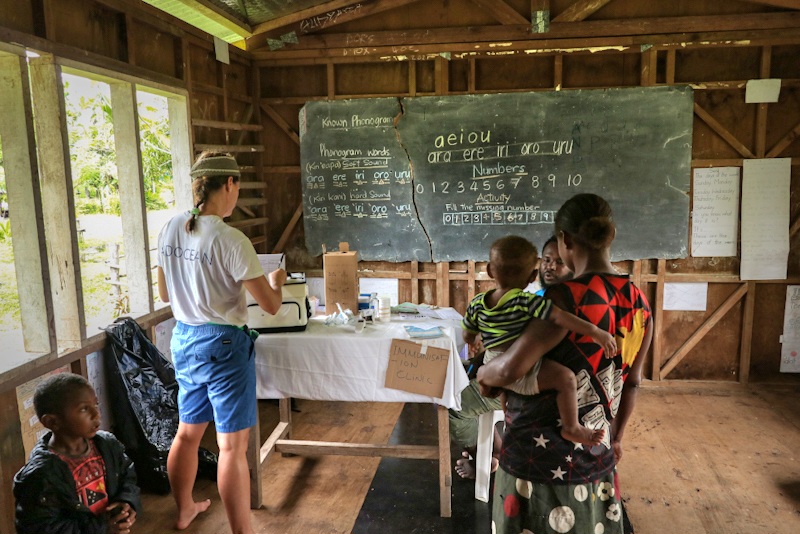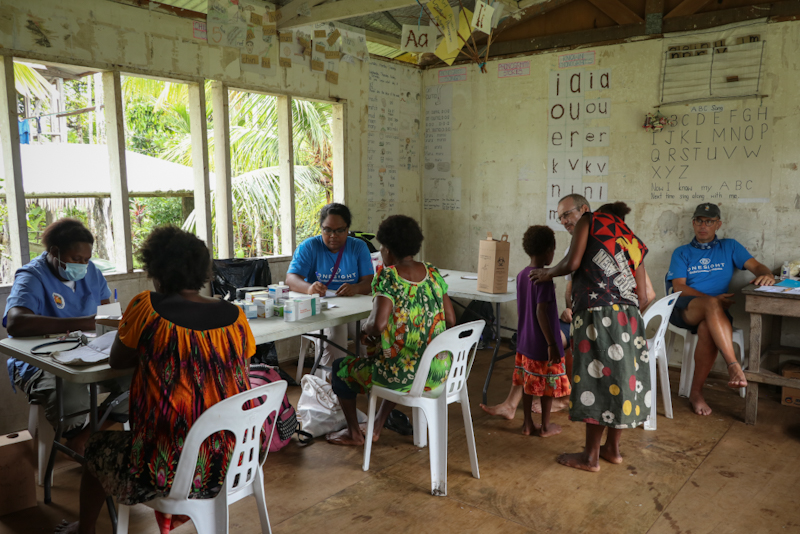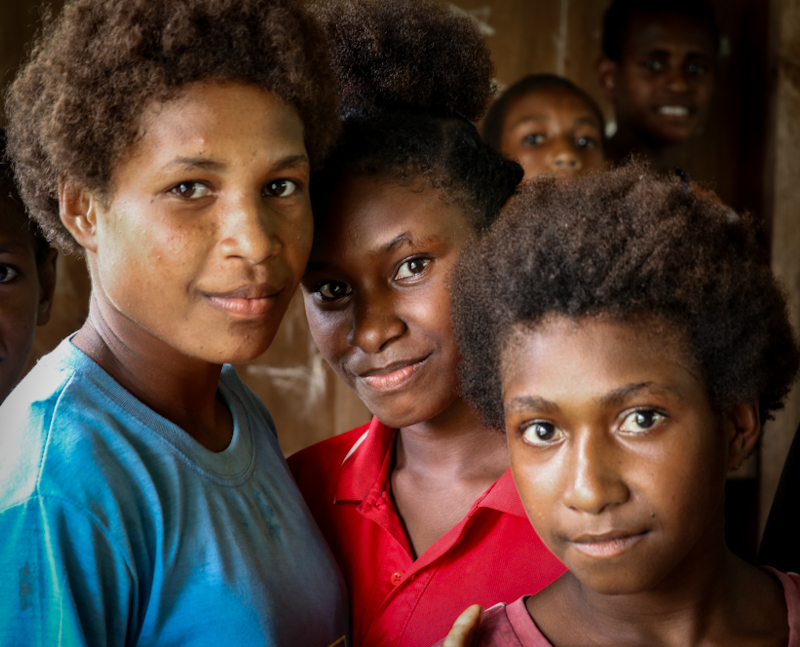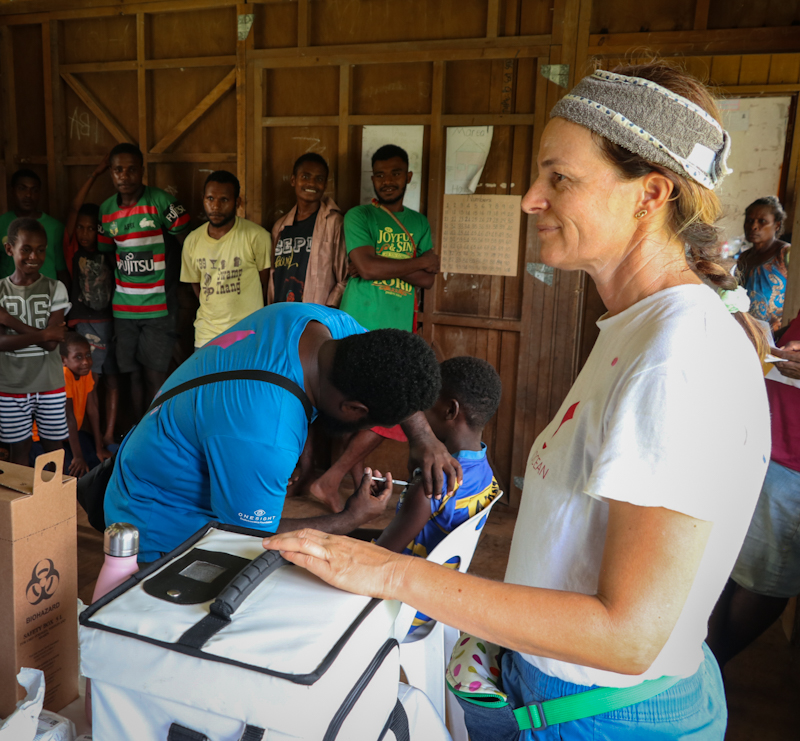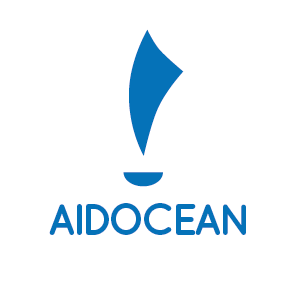This second week will take place by the sea, in Orokolo Bay. It will also be a change of team, both Papuan and French. To read directly the day you want, click on the date below.
Day 9: Thursday, April, the 18th
Early morning departure for the hour-long boat trip to Harevavo, our new destination. A village that stretches for miles along the coast on the map. In reality, it’s a multitude of hamlets, all set against each other. We sail through the mouth of the river, meandering between grey water and vegetation. High tide, deep green… reflections. A white heron lights up our eyes with its flight. We slow down with each pirogue to avoid submerging it with our wave. An hour later, we dock in an arm of the river in front of some graves. On the other side, the ocean breaks its waves on the beach
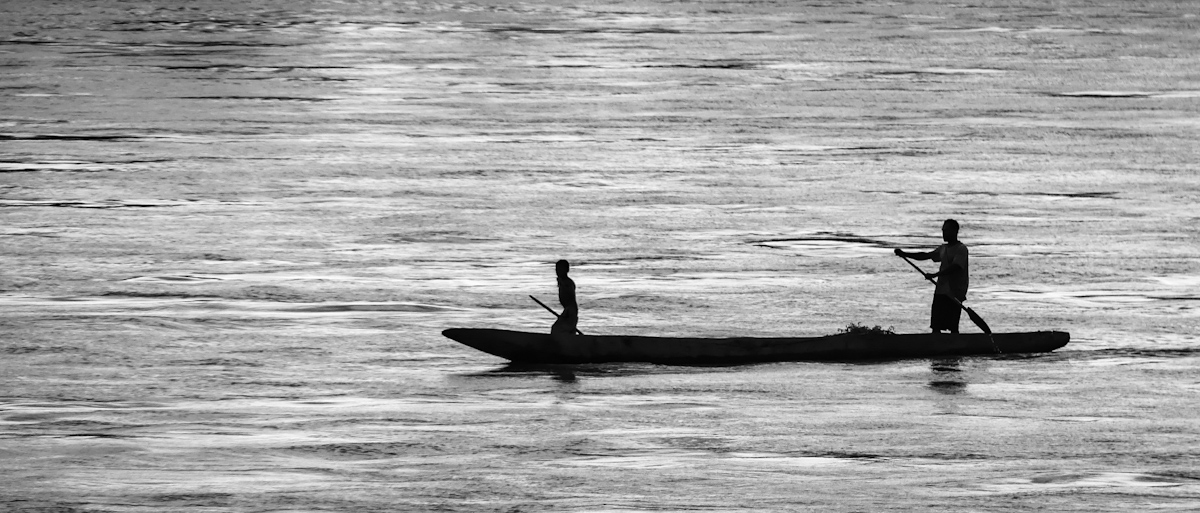
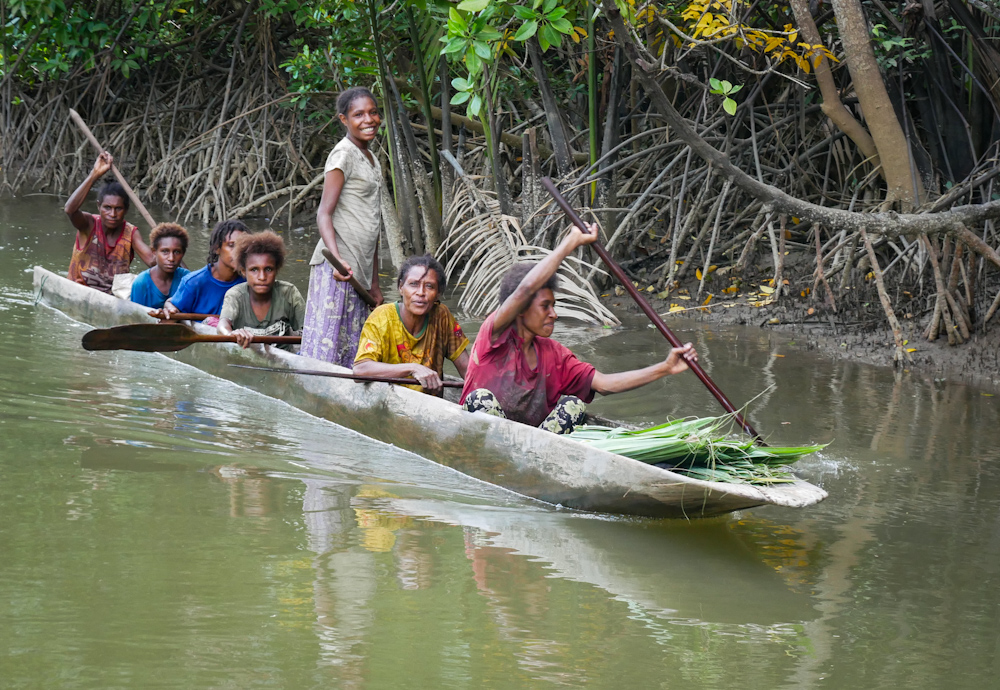
We go right under the stilts of a house under construction, that of one of the members of parliament who is never there. A vast space to settle into… almost nobody. This morning is market day. People will come later… We go there. An incredible welcome… like stars after a soccer match. People cheer and form a guard of honor at the entrance, shaking our hands. Smiles widen their eyes. People give us fruit. Shopkeepers have their photos taken with great ease and amusement. After four doughnuts, coconut buns and two bananas, we return to our business.
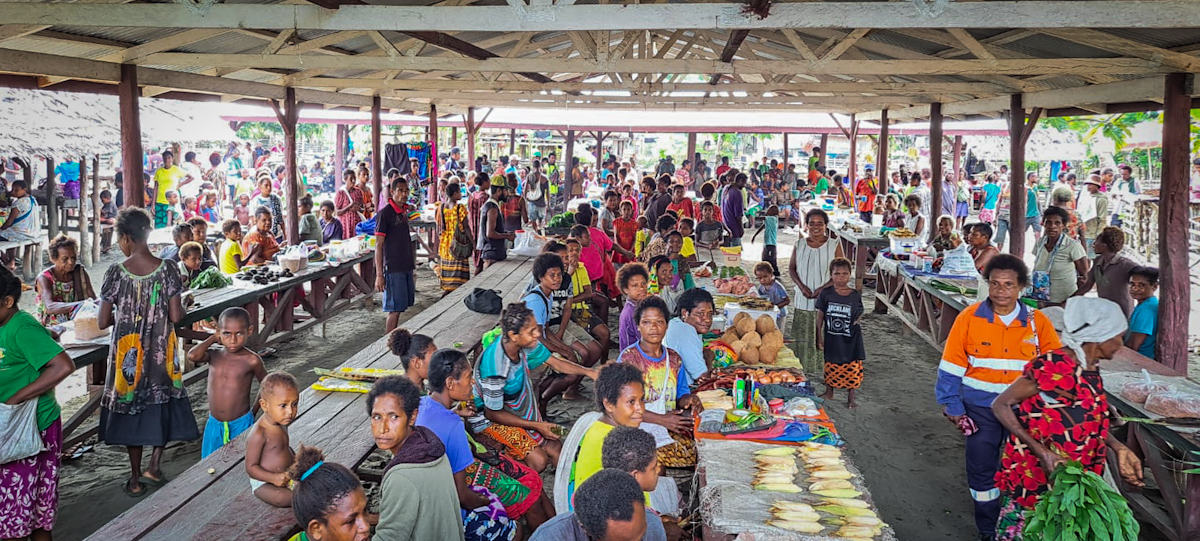
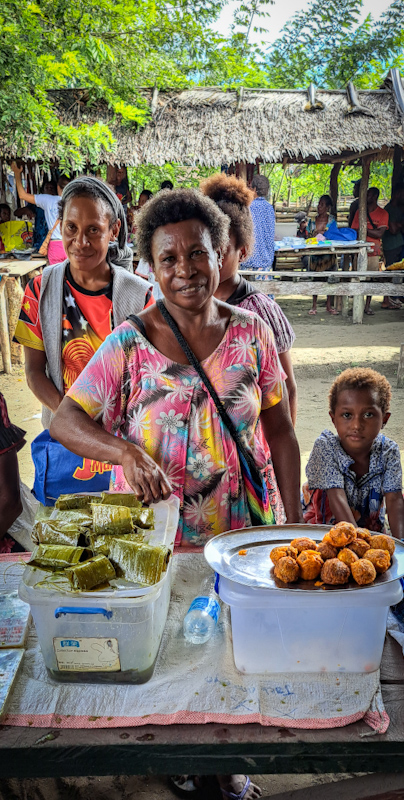
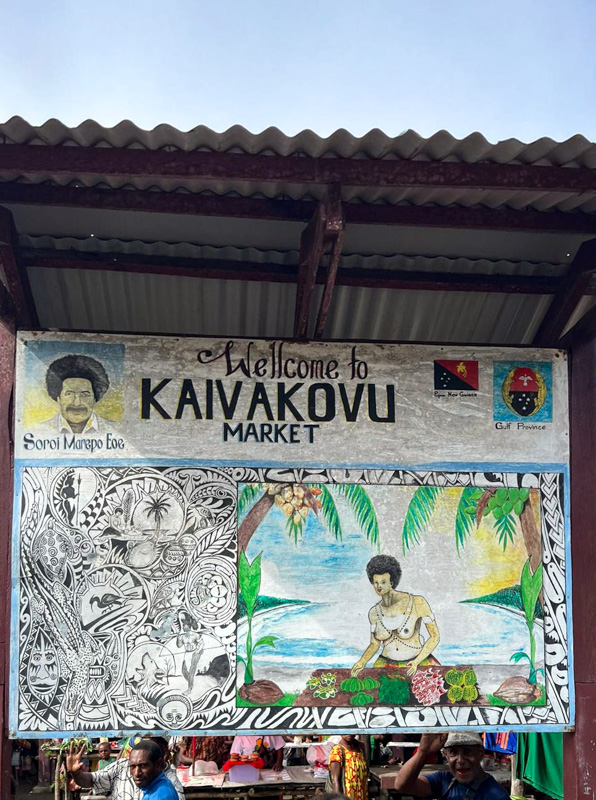
On the road, a mother accosts us. First consultation. Her son has polio, is deformed and suffers from pain when he walks. Back to reality. But every village is different. The seaside definitely has less malaria than anywhere else. Here too, at high tide, the streets are submerged. Sand and salt water are everywhere. Tuberculosis is ubiquitous, as is a little leprosy… And old people like nowhere else with their chronic pain. People here live a little longer than elsewhere… But access to healthcare is not much better. As on the previous day, we find traumas that are a month or a year old… too late to do anything about them. A young girl with a ninety-degree elbow, a knee with stitches that have been buried for three years. And the need for implants… to the last limit… to the point of almost being trapped by the low tide with the boat.
Day 10: Friday, April, the 19th
Kaivakovu. Team change day. Up even earlier… Same route as the day before through the canals. We land in the same village, in front of the same tiny cemetery, this time to go just a little further. Another ten minutes’ walk and we’re sitting on the market benches. Yesterday sweet potatoes and bananas, today antibiotics and painkillers, and for the same price you can even have your teeth pulled…
The small crowd crowds in front of the stalls of daily aches and pains… who has an ear infection, who has a chronic cough… In the houses, as in Caledonia, most people cook and light fires indoors. Bronchial tubes don’t like this treatment, and many people in these villages have chronic respiratory pathologies… A machete wound was reported ten minutes ago.
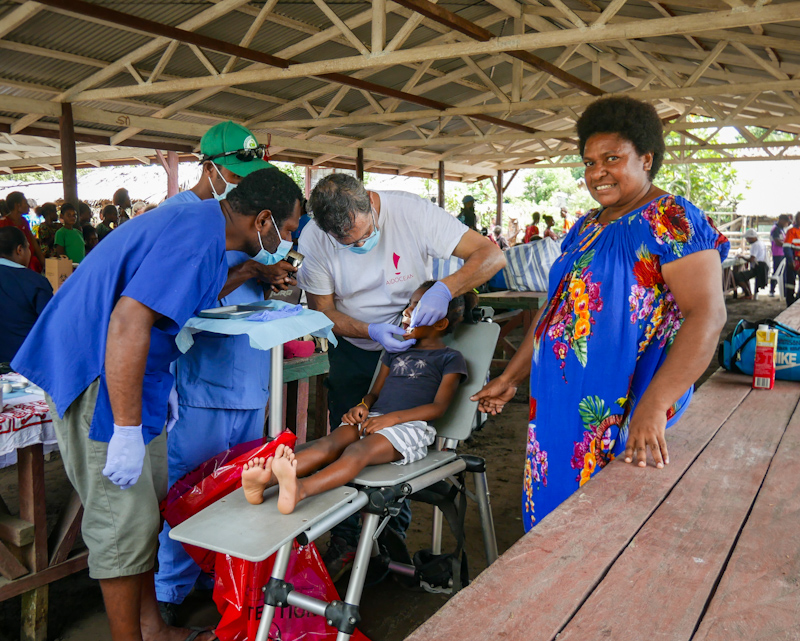
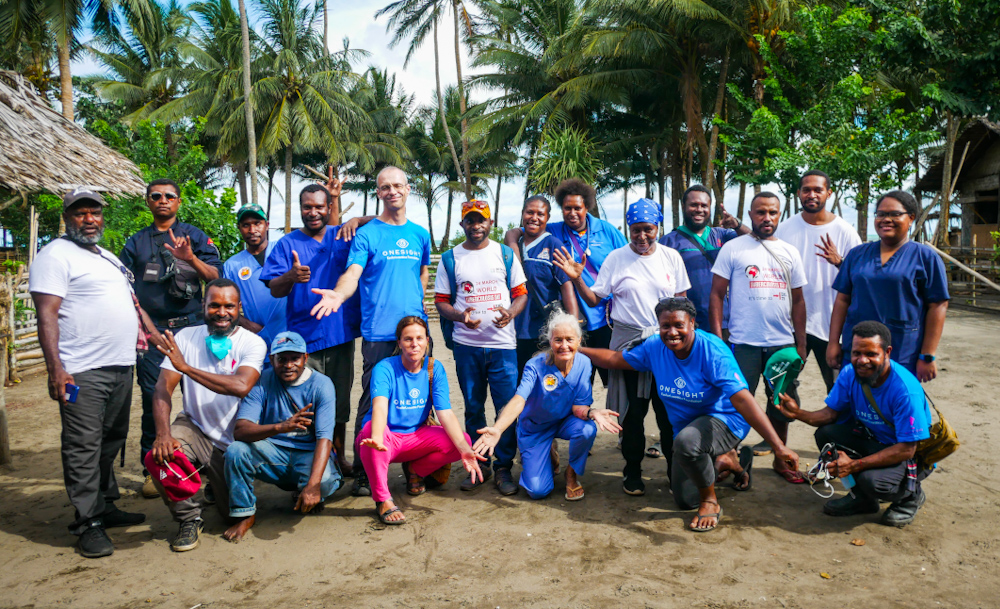
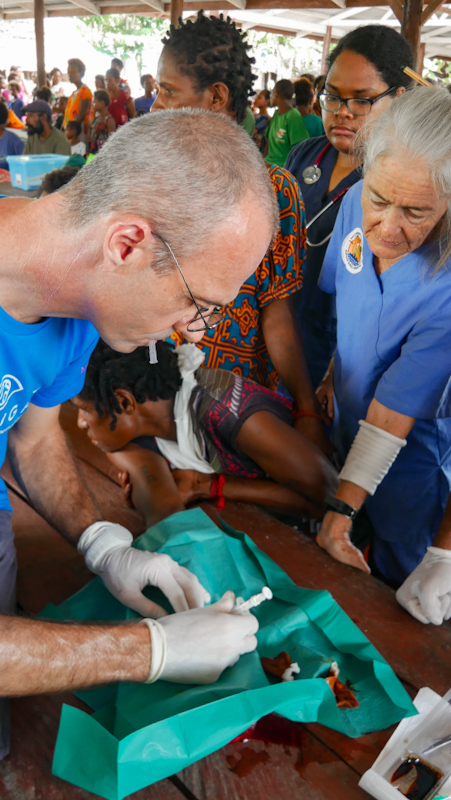
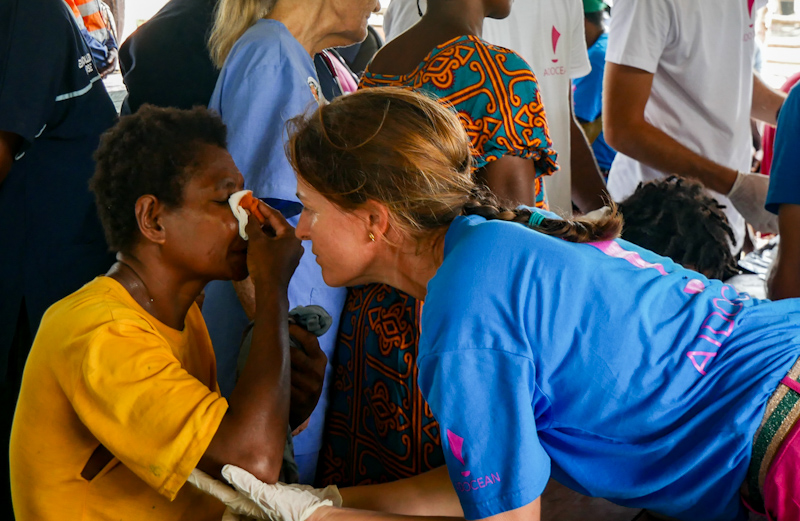
Dr. Valerie moves from table to table, keeps an eye on things, consults patients and gives advice. Immense experience of exotic or forgotten pathologies… Leprosy and tuberculosis to the fore…
It’s midday, and we say good-bye to Jean, Elisa and Fred, who are (already!) heading back to Nouméa. See you in a couple of weeks for a beer… For now, they have an hour’s walk along the beach to the next village, with luggage and porters to reach their helicopter. Tonight, they’ll sleep at Herd Base, before taking a short bush plane to the airport tomorrow morning.
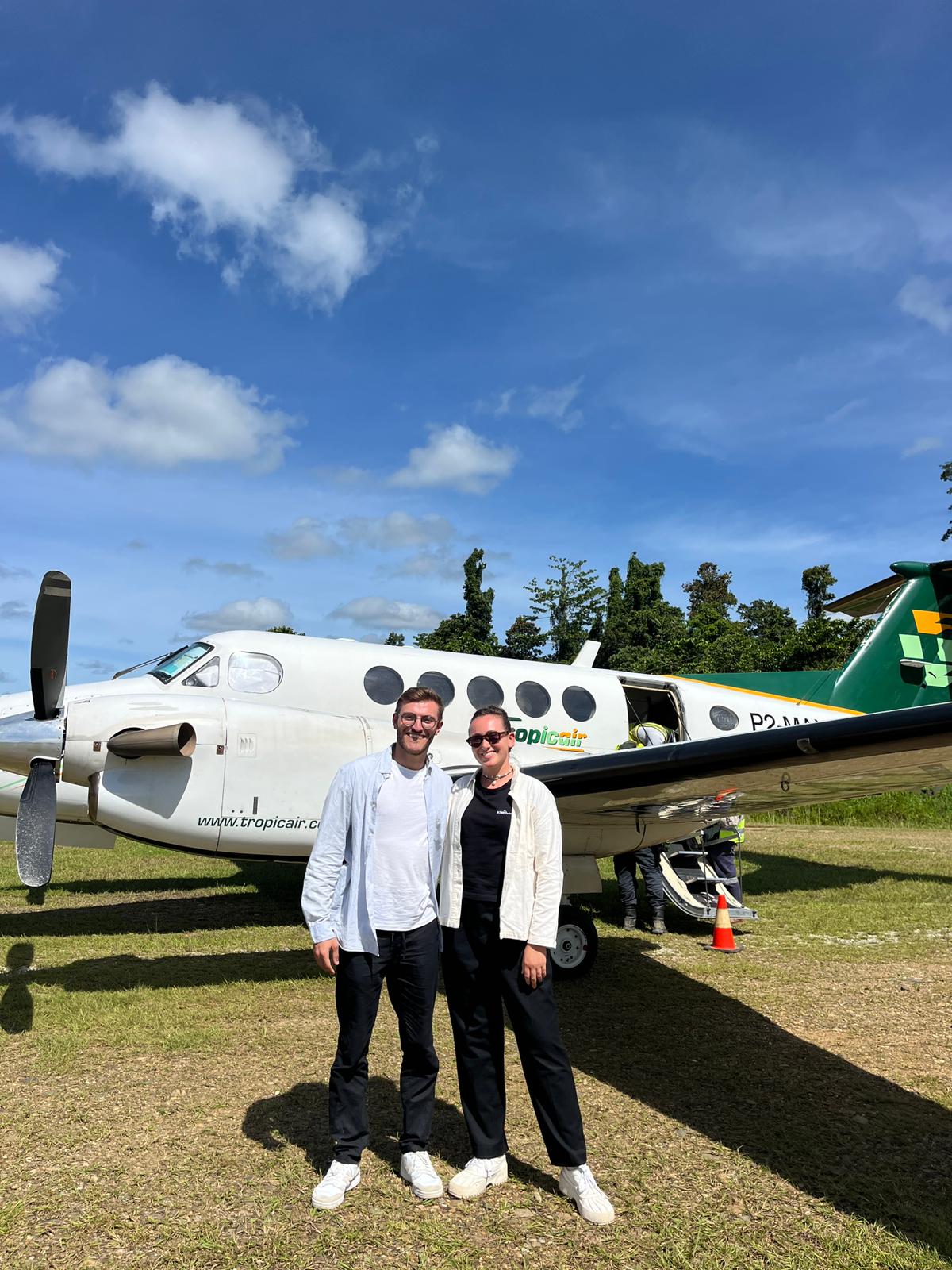
It’s time to head back to the boat. Tomorrow we’ll meet up with a fresh team after a 30-hour flight for those arriving from France: Agnès and Maud. And those from Caledonia: David and Francoise.
Day 11: Saturday, April, the 20th
Early morning in the boat, which once again takes us to the village. The maze of canals continues. The discovery of the first day has given way… with our noses to the grindstone on our laptops, we make the most of this hour of navigation to get some more work done. When we disembark, we find a load of porters for our equipment. The village is still a little further away, and the walk takes longer and longer. Half an hour… then a sandy town square under a roof of tarpaulins and palm fronds. We’ve passed yesterday’s market… crowded with people. We already know that people will be arriving in dribs and drabs. Settling in is laborious… if not downright indolent. The dentist’s instruments forgotten the day before are put to sterilize in a pot. However, the first pot had a leak that prevented the fire from taking off. To plug the hole, a bit of sego is thrown in… The resulting mush is not convincing for use… New pot, new try with clean water. After boiling, some liquid is missing, and the instruments don’t all soak perfectly. In short, a bit of folklore for a few bacteria avoided.
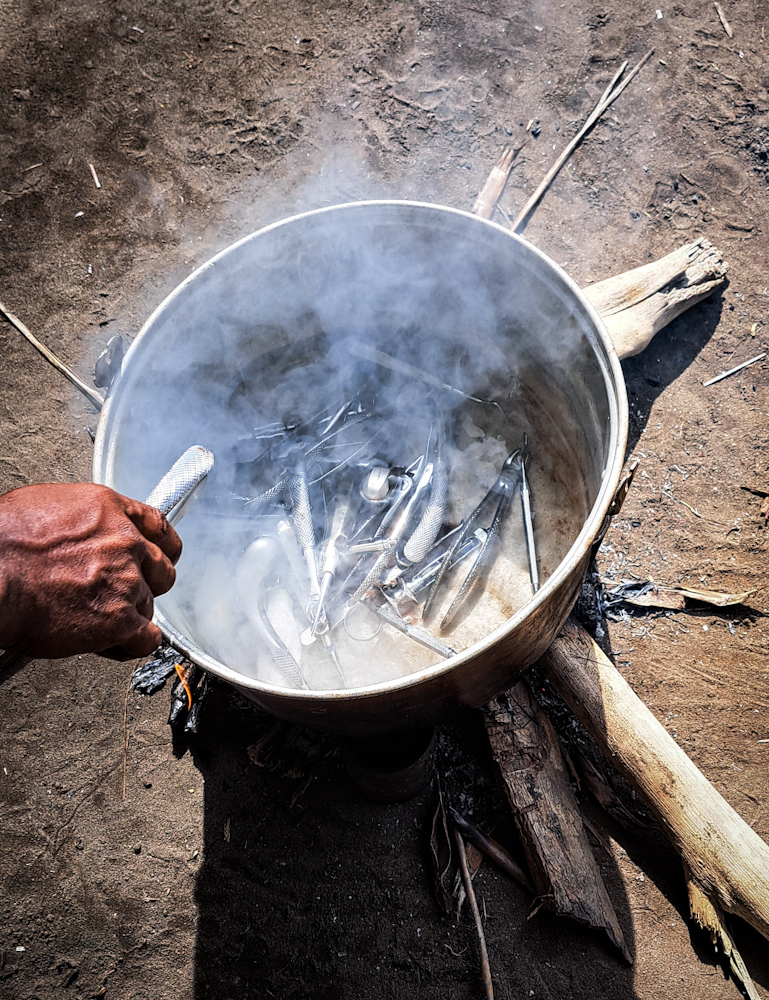
It’s already two o’clock and a leprosy case, a child with tuberculosis farther and the Kapuna team have to get back on the boat, with some four hours of sailing against the current to get home. It’s time to say goodbye. In a dramatic turn of events, one of the two patients seen by Dr. Valerie has just died. A wave of consternation sweeps through the ranks of the local health workers…
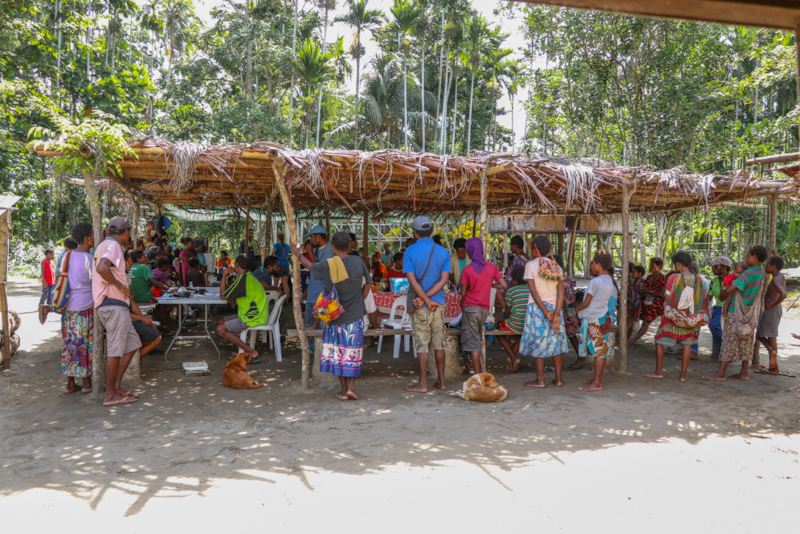
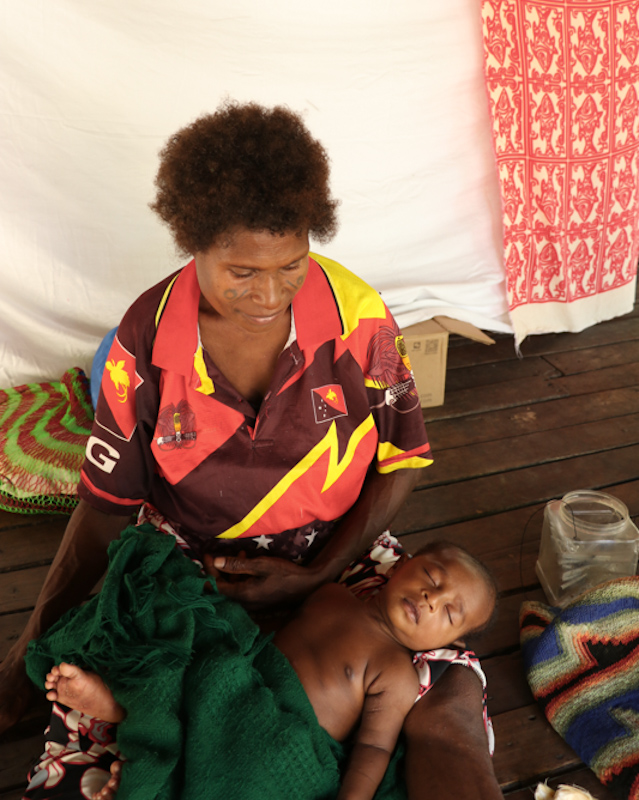
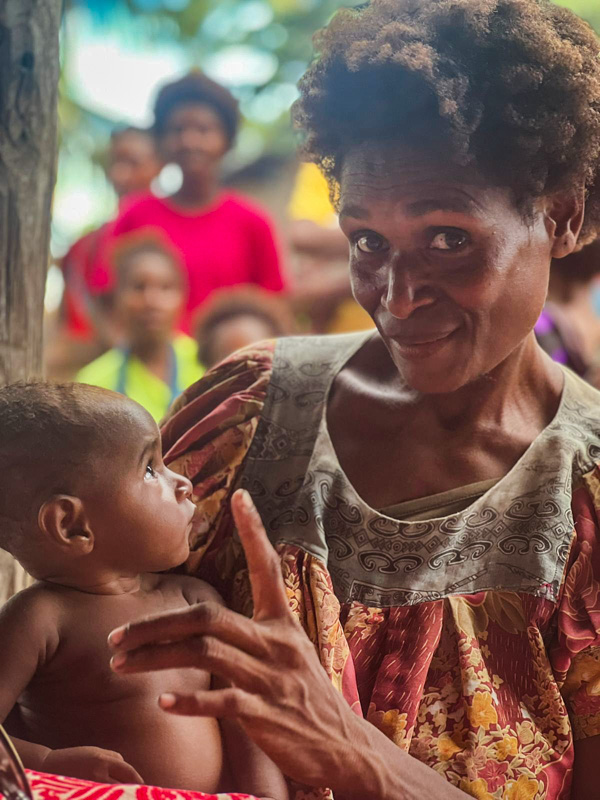
One man arrives with a blue suitcase slung over his shoulder, another with a box of medicines. First in the procession of new arrivals. Pants, shirts and sweat on their foreheads, the fresh team has been immersed in the hot furnace in long sleeves for half an hour of walking under the sun… Thirty minutes after their arrival, it’s time to go home. The end of the consultations will leave some disappointed, as we didn’t get to see everyone today. We’ll probably see them again on Monday when we move to the next village.
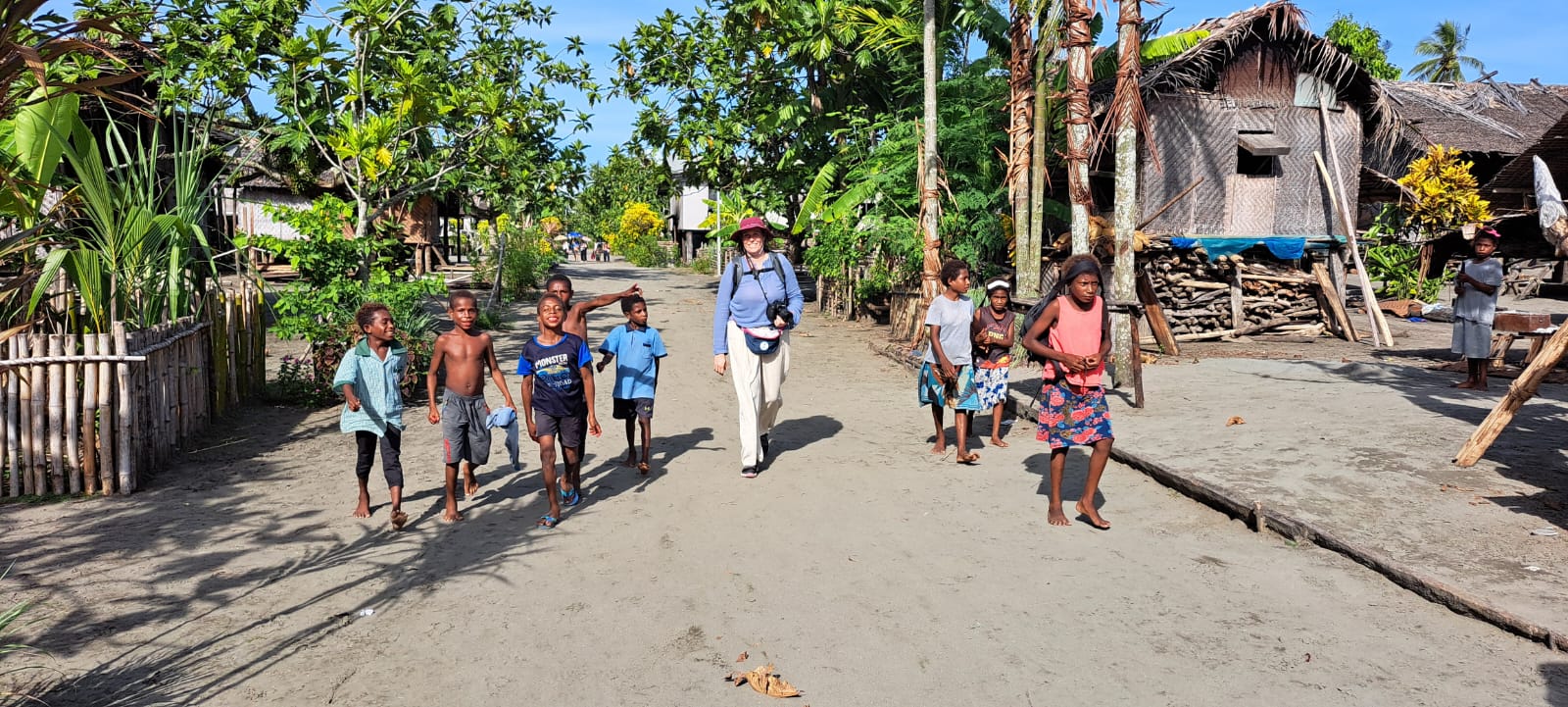
A little more walking and an hour’s sailing for the new arrivals. The journey never ends for those arriving from France. Once we’re on the Silverstar and our rooms have been allocated, the welcome briefings begin… and the fatigue adds up. The night will be beautiful… but probably cut short by a few awakenings for some. The jetlag is likely to linger for a few days…
Day 13 : Monday, April, the 22th, 2024
Yesterday was a day of rest… well, almost. We took the opportunity to take stock of our medicine supplies, tidy up, take a nap, do some sport… The day on board passed quickly.
Further and further along the coast, an hour’s sailing then a little over an hour’s walking. Early-morning warm-up through villages and vegetation, accompanied by volunteers carrying medical equipment. Single file procession in the pseudo-cool morning air.
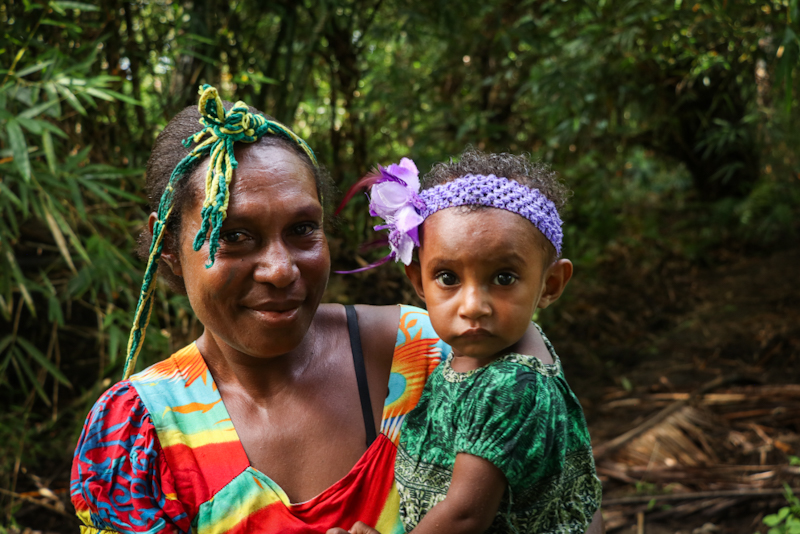
We arrive at the Orokolo dispensary. Hard-built pavilions, poor interiors… a series of empty walls. Only one large room has metal beds without mattresses. On one of them, in a corner, a woman gasps in silence, slowly dying of tuberculosis. Her 11-year-old son sits at the foot of the bed, holding her hand. We scan the layout of the rooms to set up our equipment. Tables and chairs appear to fill the empty space. The heat slowly rises and the speeches begin to kick off the consultations. Barely settled into a tiny desk on which I’ve thrown a few boxes of medicine, an old man is brought to us on a bamboo stretcher. He is immediately placed on a hospital bed. “I told you I’d attract work,” David says. I scratch my head.
Twenty minutes of questioning later, I finally understand that he’s suffering from intense dehydration and acute renal failure. Death is not far off. David perfuses him, and we rehydrate him with solutions supplied by the dispensary. We’ll see if he passes… or not. With no other means of diagnosis and given the seriousness of the situation, we have no other choice…
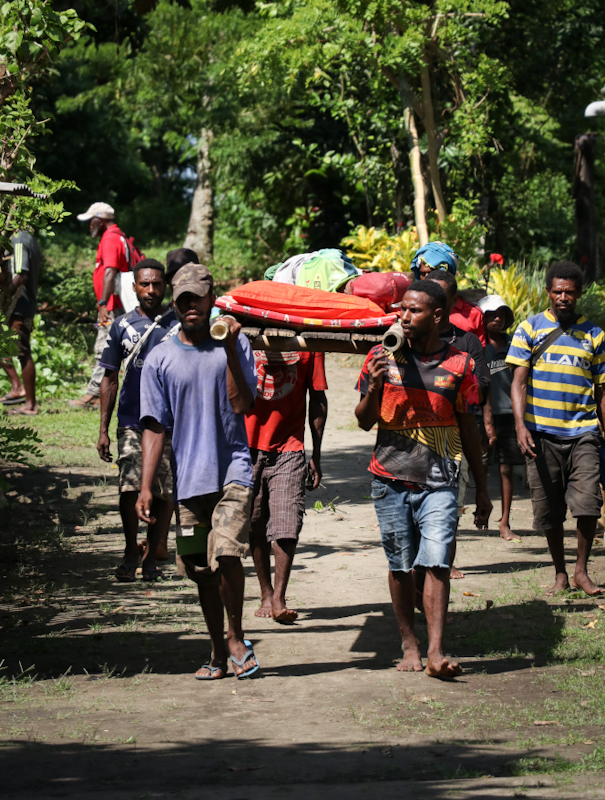
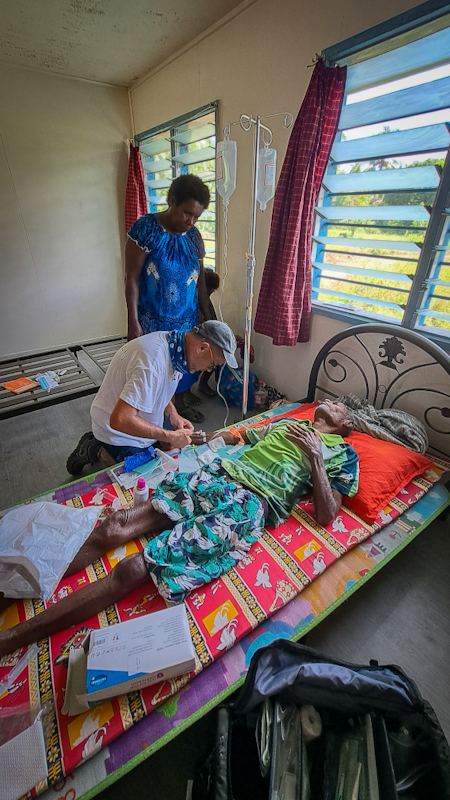

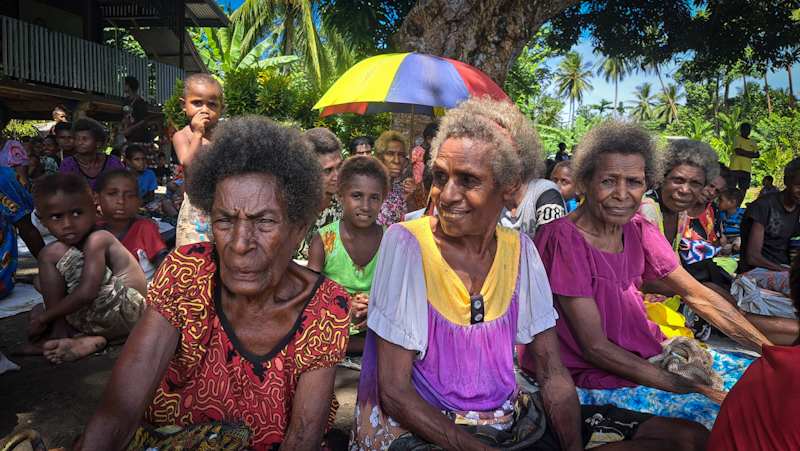
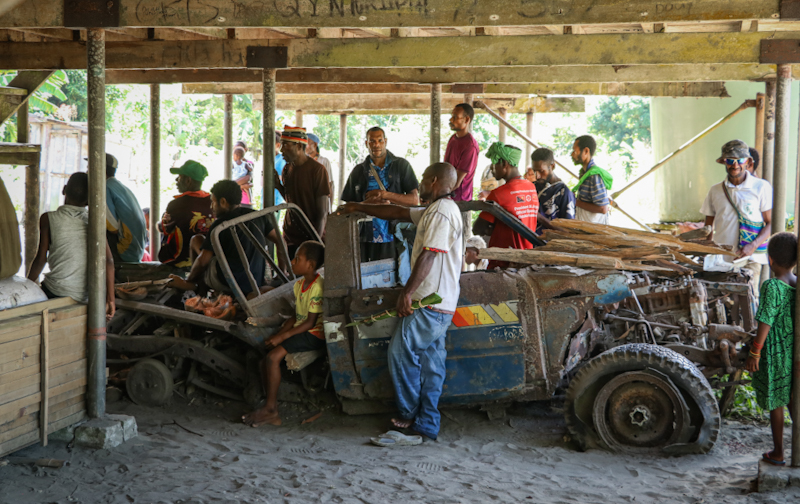
The morning passes in a furnace-like atmosphere… one patient after another. David comes to lend me a hand. And once my water bottle has run out, I go out to beg for some coconut water to keep me hydrated, while Maud provides me with bananas. The end-of-day gong rings at 3.00 p.m. in the sweltering heat, as the tide dictates its whim… We walk along the beach to avoid a return trip under the sun… The shower will be good.
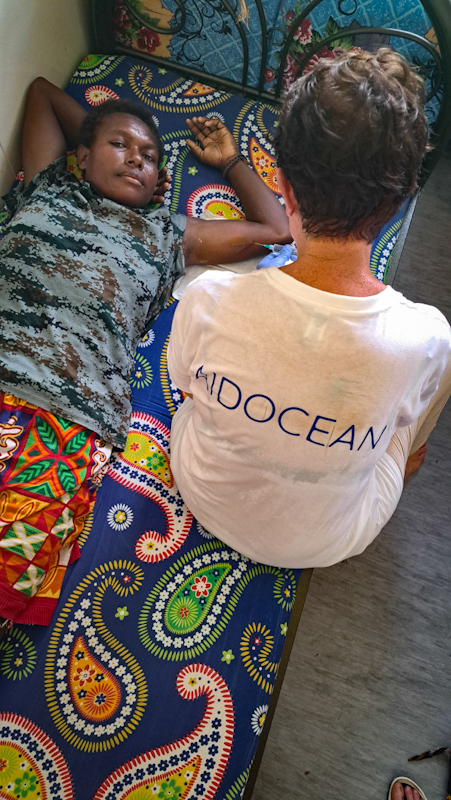
Continuation and end of the medical evacuation: Aidocean has paid for the entire journey for the girl and her heart failure to get to Port Moresby by banana boat and bus. Another patient will also be sent at the same time. We’ll have done all we can for them, so let’s hope they get better.
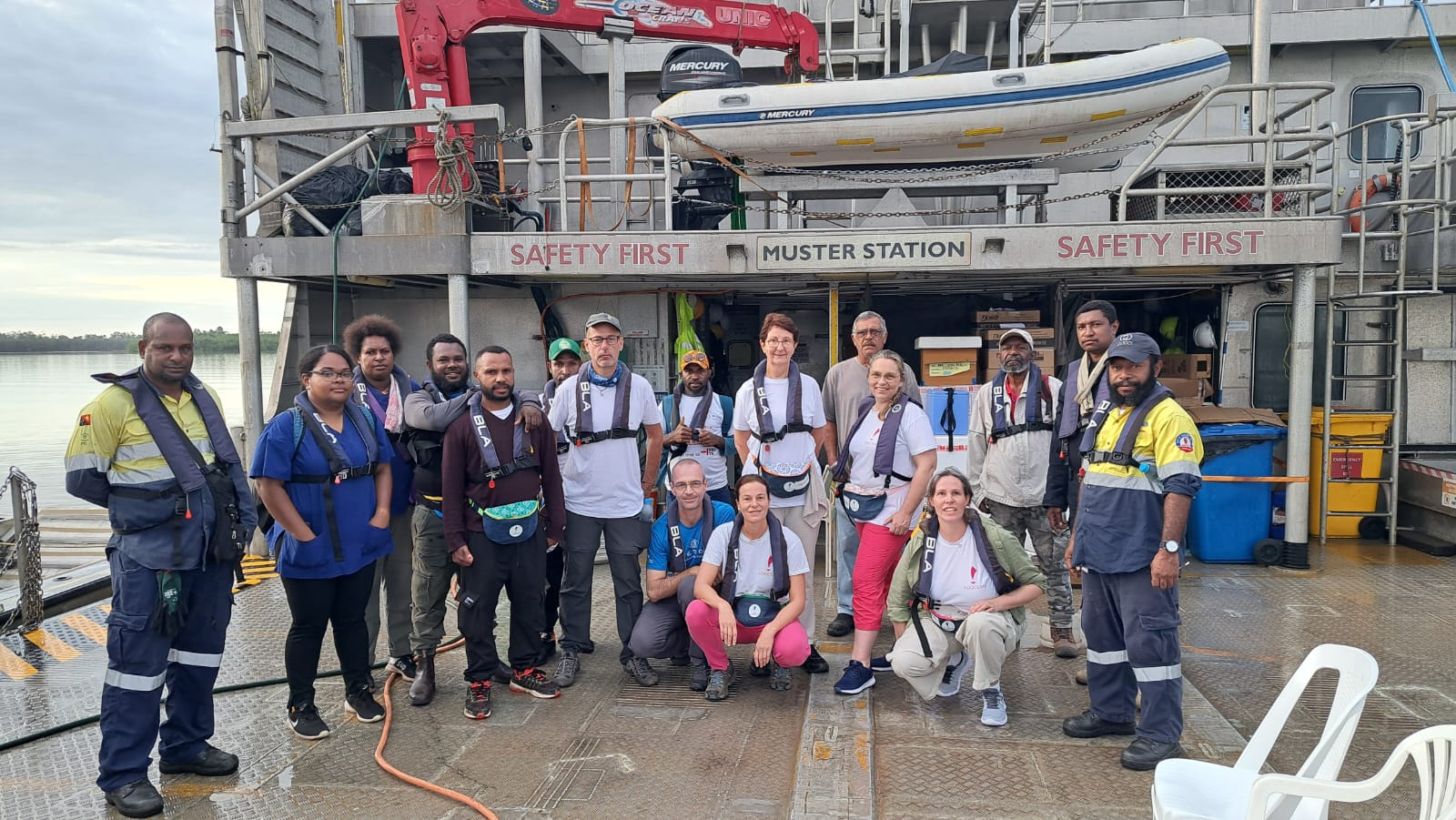
Day 14: Tuesday, April 23
Probably one of the hottest days so far. Given the long walk to Orokolo, the locals won’t be carrying 20 kilos, so we make arrangements to carry it ourselves via a wheeled cooler… Another hour’s walk today, en route to the same village as the day before to finish the job… On arrival, we find our dehydrated patient still alive, and we continue his rehydration session throughout the day… It’s not impossible that we’ve helped him out of a bad situation.
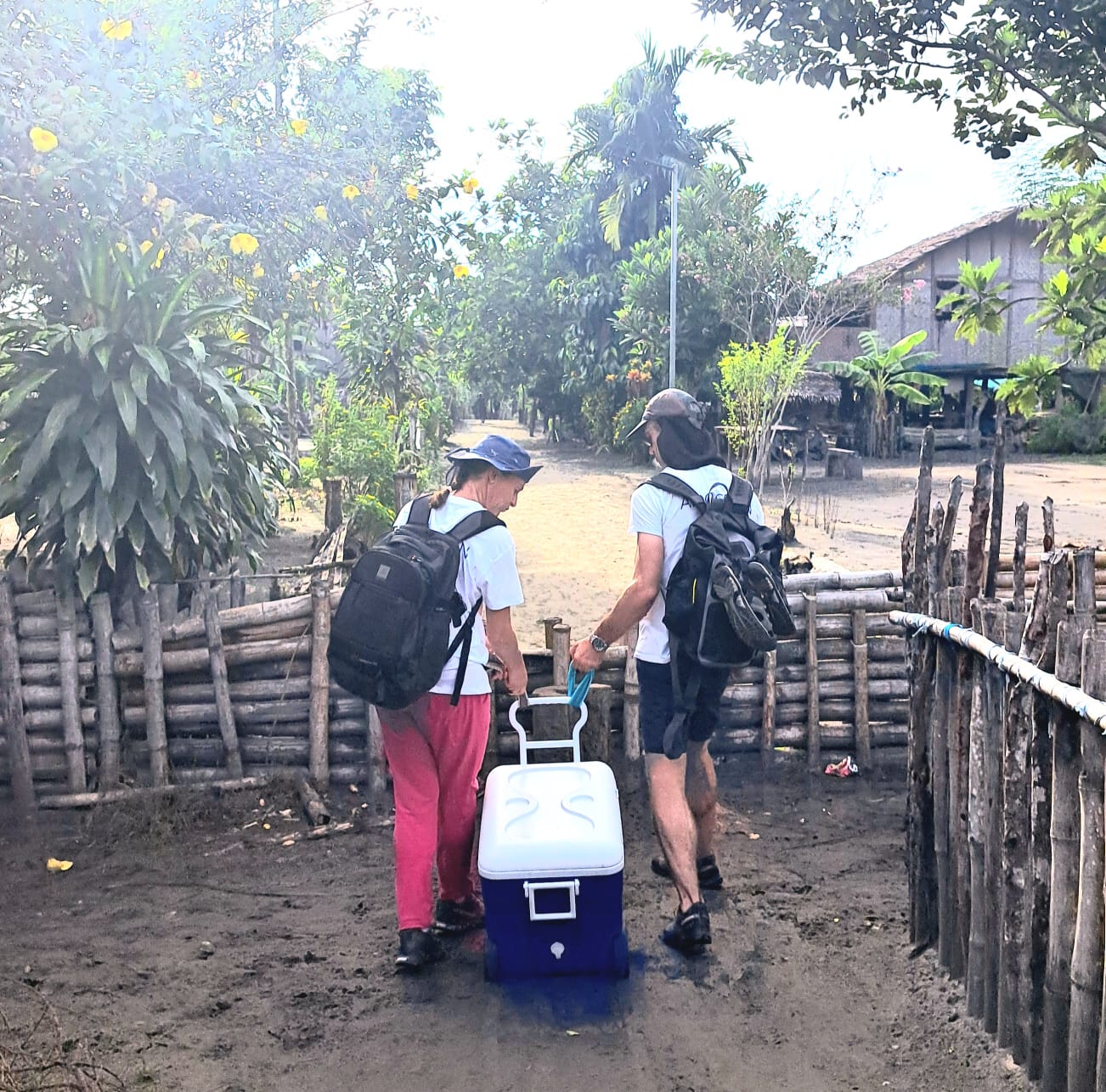
Shortly after our arrival, we visit an old lady at the end of the village. We are promised a 5-minute walk, which turns into a few kilometers and an hour to get there and back. No real solution for a paraplegic for 7 years… And the day goes on, with many of the patients who come to us with ailments that have been going on for years, naively hoping for a miraculous cure. Unlikely exostoses (bone growths), amputations, dislocations… All we can do is hand out a few painkillers with a rueful look and a smile. It can be frustrating.
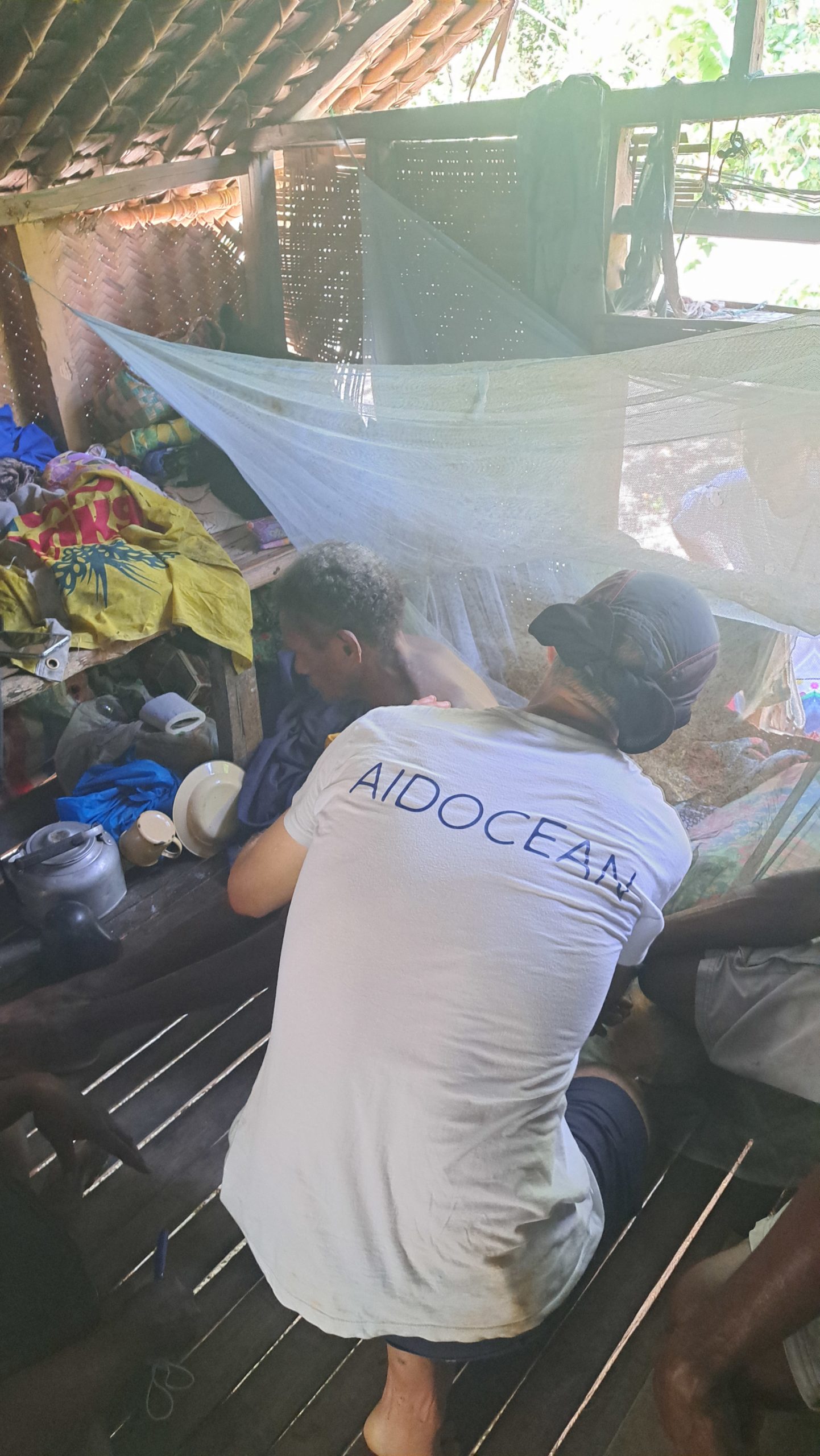
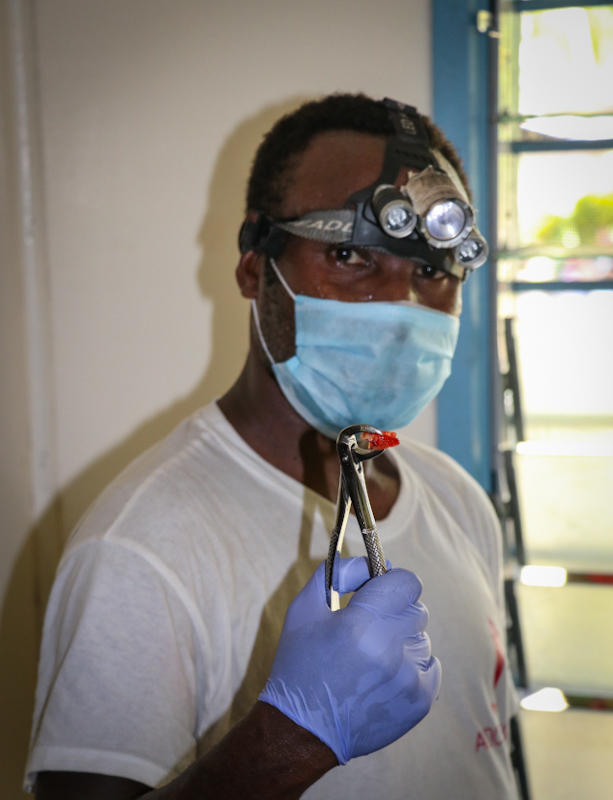
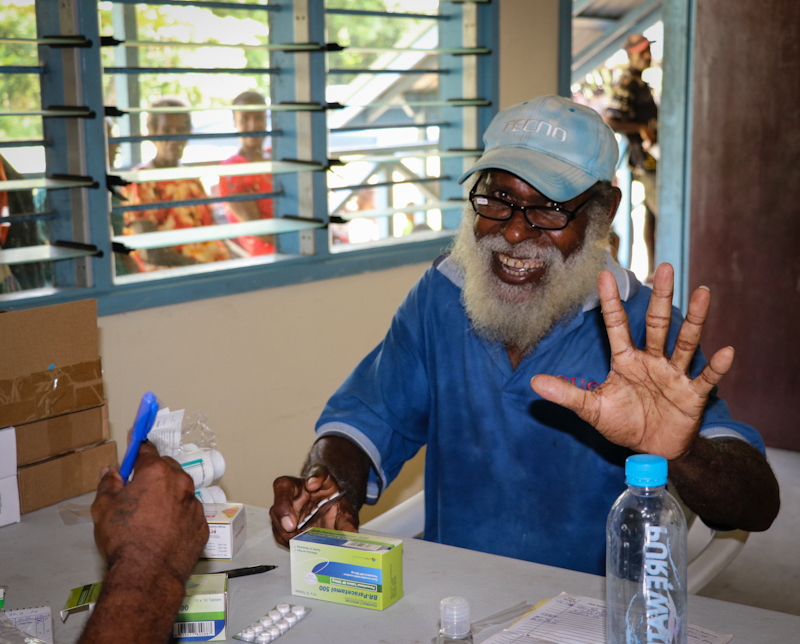
The return journey, which some of us will find interminable, will be via the beach, a few kilometers in the sand under the sun with the surf… the club med will be back for more. The shoreline is never-ending, and at this time of day, it seems that village life is concentrated here. Children play in the sand, digging holes, women return from fishing to empty their catch… lots of small sharks, a few swordfish. Closer to the houses, people gather to chat under small “farés” with the sea spray in their faces. Our procession passes by, it being our last day in this place, and we bring back the chairs and tables and all the equipment we’d left behind day after day. A veritable procession at sunset.
We left a few medical products in the dispensary to supplement their sparse stock… On arrival.
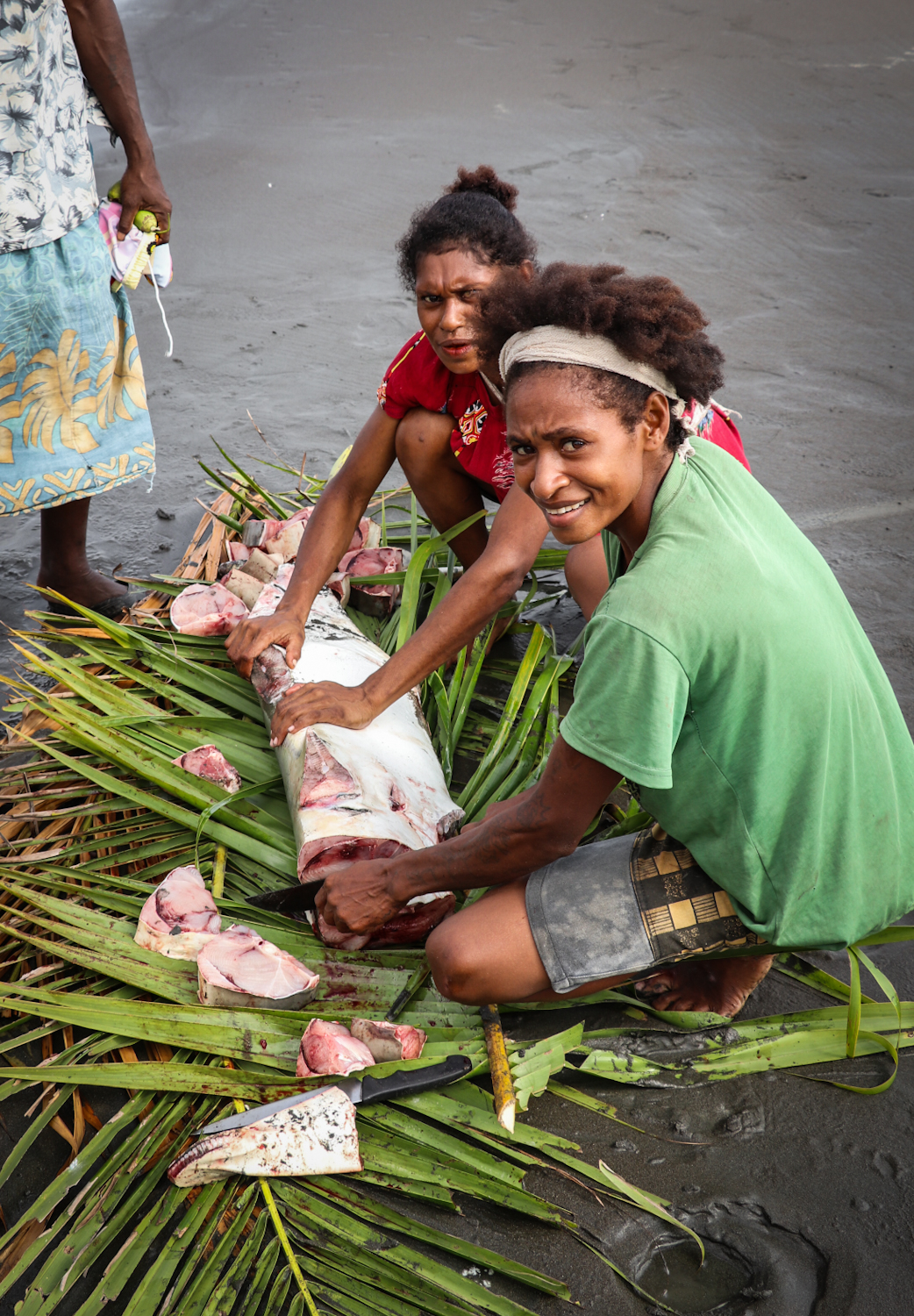
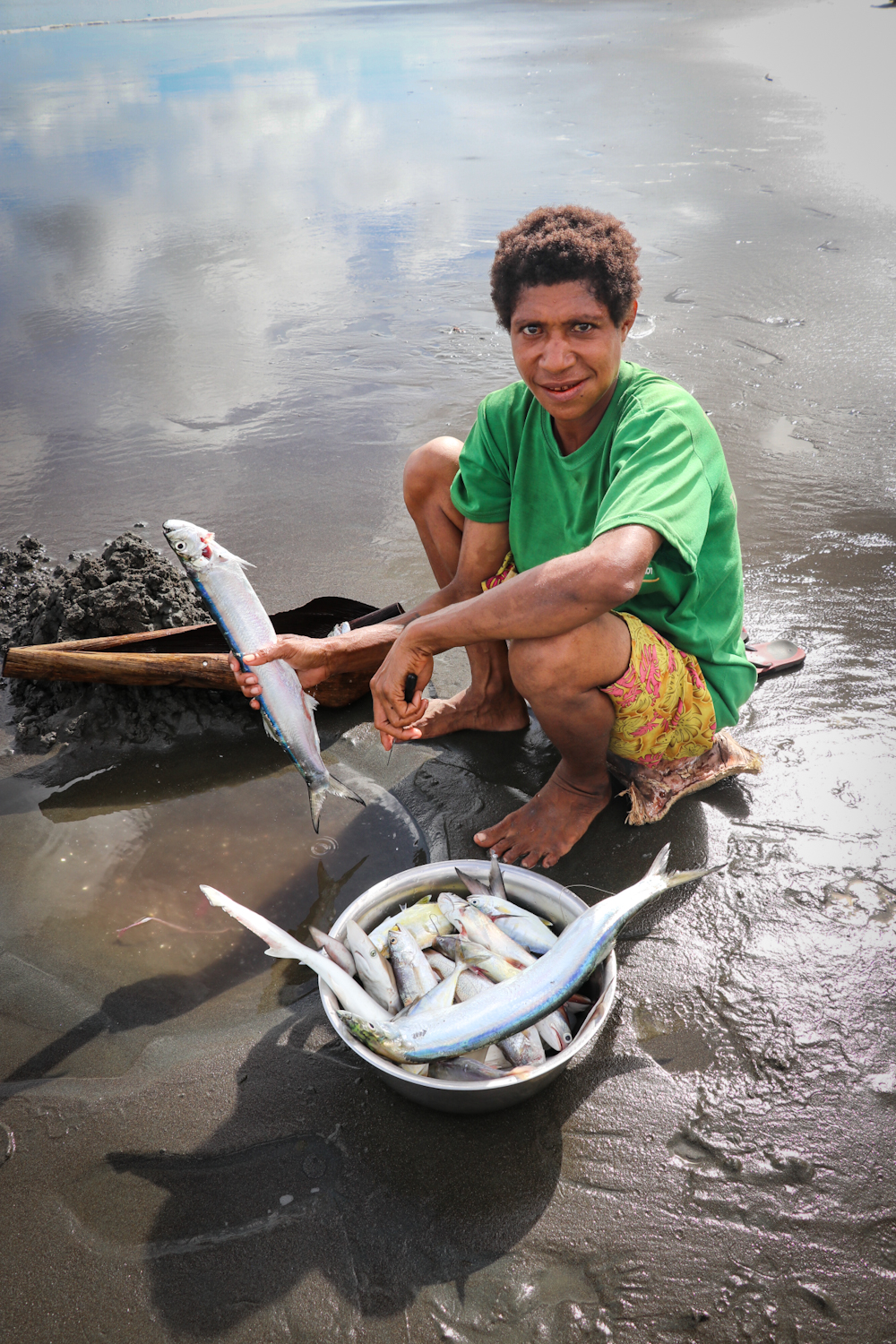
Day 15: Wednesday, June 24
The smiles on the faces of the old folks when you return the view are well worth the detour to here. And so far it’s a long way.
An hour’s boat ride up a narrow river branch, slaloming, tapping and pushing tree trunks. When it comes to other people’s boats, we’re immediately less anxious when we hear the thudding impact on the hull, it even makes us laugh… unless we’re sinking. We’d immediately feel a bit lonely in the jungle, appetizing meat for the lucky crocodile passing by. But right away, the mood is right. We unload our junk on the riverbank, right in the heart of the village. The surrounding vegetation is dense. Our arrival had been announced, and the consulting room had been decorated with flowers. Delicate attention.
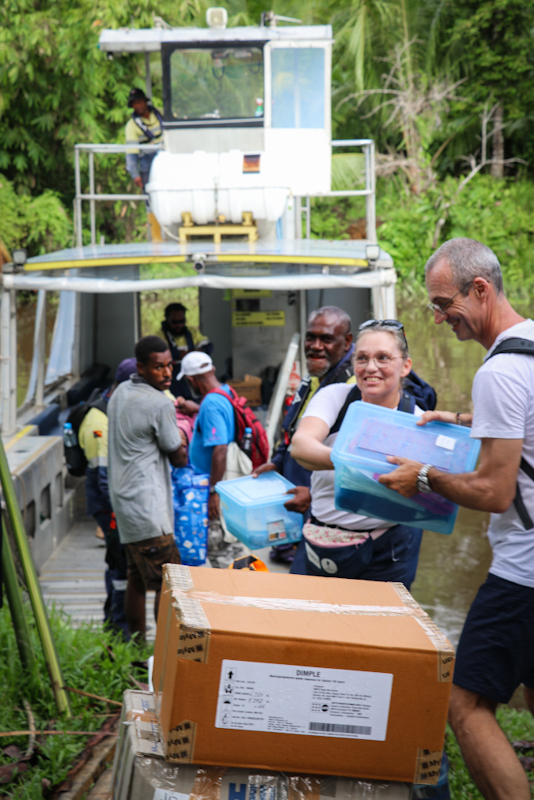
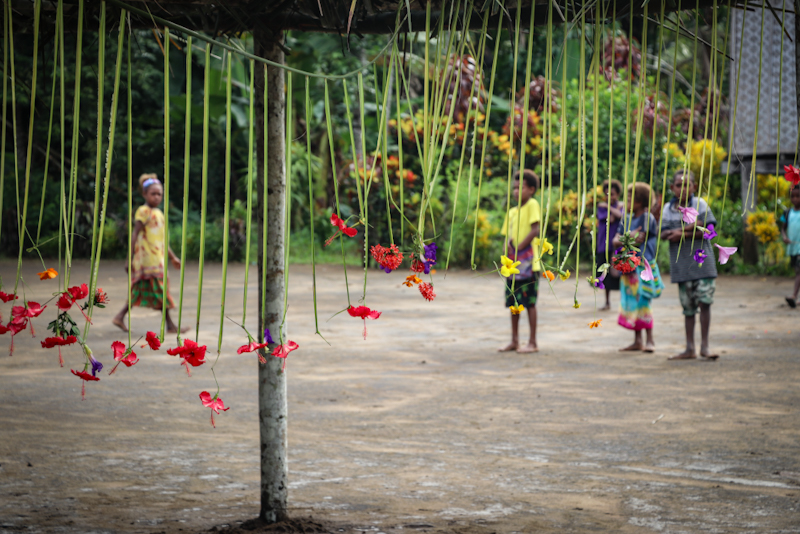
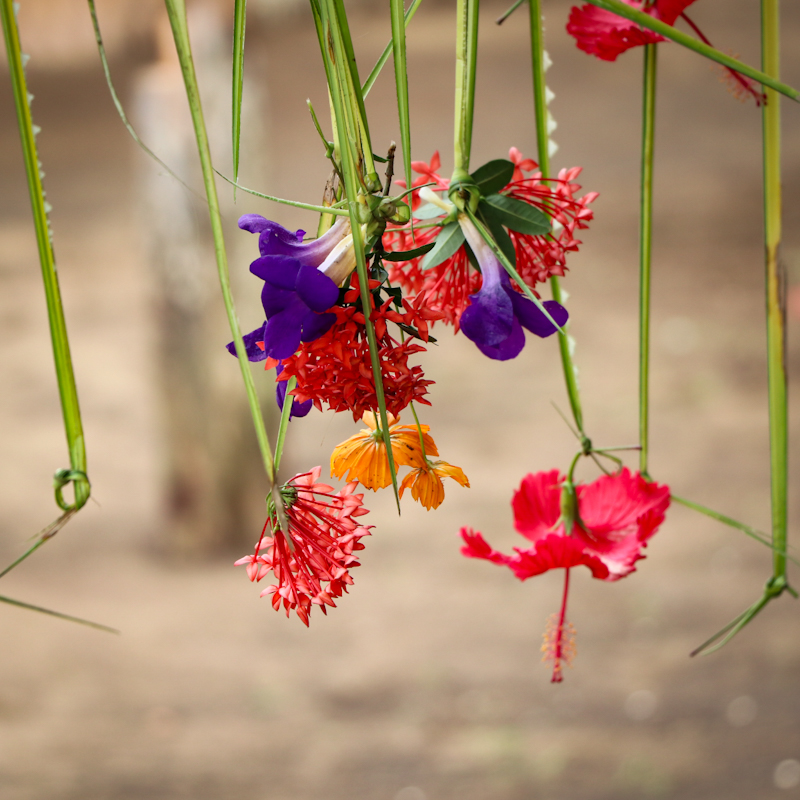
We ask the Total coordinator what time we have to take the boat back to the village because of the tide… A priori we have to leave before 3 or after 5pm… then finally there’s no real time, as the river is high at the moment. Perfect, a beautiful day ahead… Among the pathologies particularly prevalent in this village is tuberculosis, with one case of chronic cough insensitive to antibiotics following another. A case of leprosy, whooping cough and a litany of little ailments with no answers. And then there’s always the joint pain of all kinds, looking for a miracle but finding only paracetamol. By 2pm, the consultations have dried up and Marine and I are off to help with the contraceptive implants. Françoise has moved into a huge house on stilts… a bare interior… a vast room with exposed wooden beams. The interior is empty, without a single piece of furniture, and words don’t echo, just a few mats on the floor where the women lie, waiting their turn in the tropical heat.
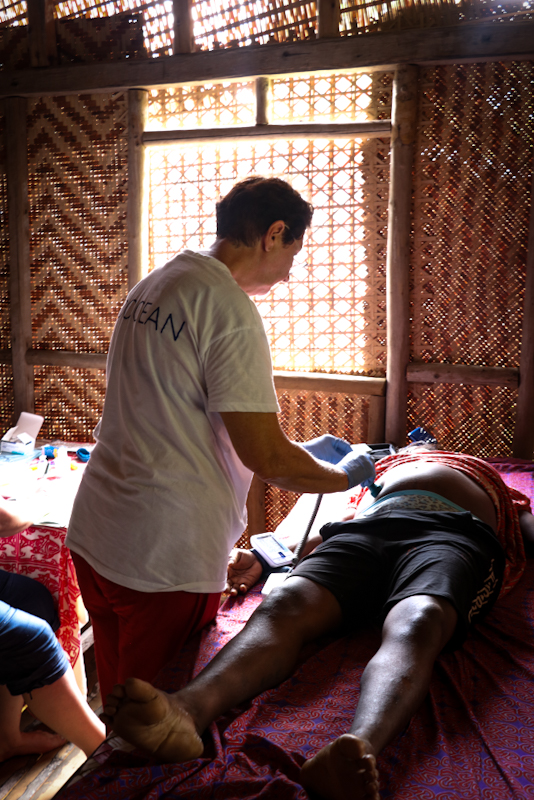
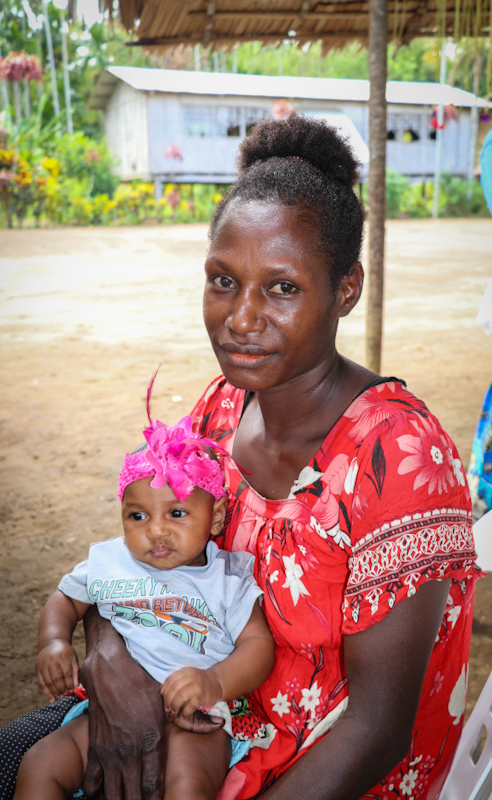
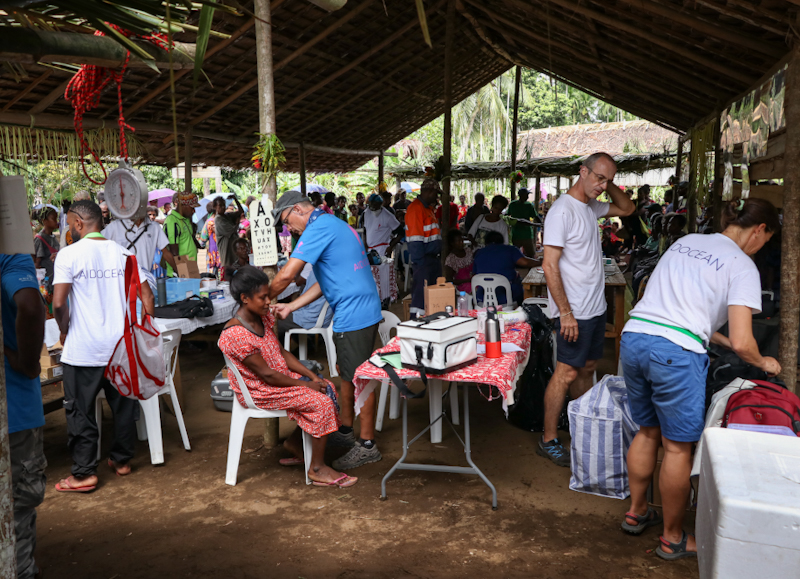
Barely enough time to take care of one patient each before we’re rushed off to pack up. The river level is said to be in question… the same one that wasn’t a problem this morning. We are forced to tell the remaining women to come back tomorrow. In the end, we return without even touching the river, as we were used to doing when we returned to previous villages…
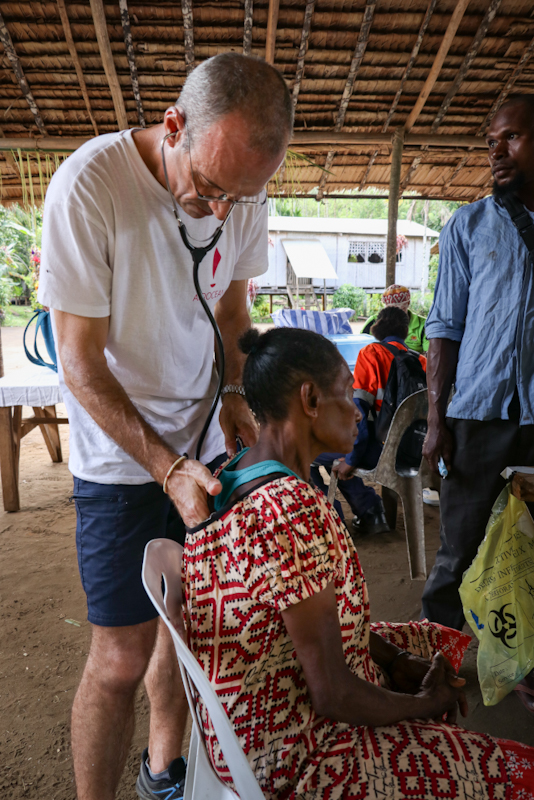
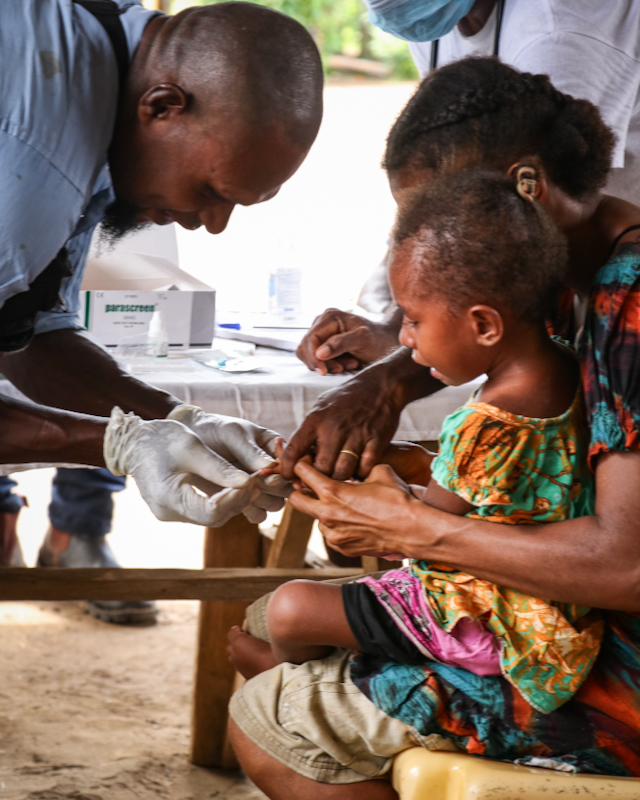
Medical evacuations, continued… but not ended. Marine has struck again: a little girl with a severe cleft palate could benefit from surgery in Port Moresby. The family is highly motivated; in two years, they have painstakingly saved 200 kinas (50 euros) for the journey. It takes a thousand. We’ll let you count the years. It’s already a miracle that she survived, thanks to her mother’s very careful care. We’re due to see them again tomorrow to give them the money they need.
Day 16: Thursday, April 25
A late start after the water supply brought by a small container carrier, 32 cubic meters according to the captain… enough to last until the end of the mission. Our water consumption is unreasonable.
We return to the same village as the day before. An hour later, just as we’re settling in, the Kapuna health team realizes that a box of medicines has been forgotten… The boat sails an extra two hours to make up for this oversight. We can work in the meantime with the help of my bag.
It’s a quiet day, with a few people arriving in dribs and drabs, working in a smooth atmosphere, without any overflow… there’s still a bit of time to get David’s drone flying. Around midday, we take over from Françoise and Maud to allow them to eat. Almost luxury.
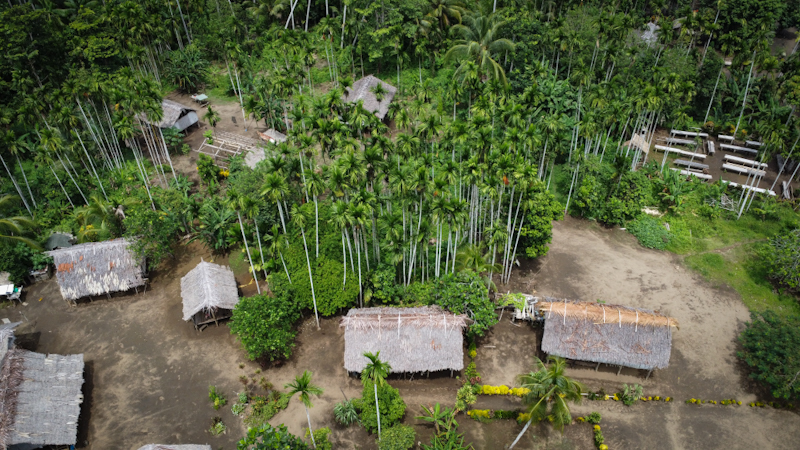
The family of the little girl with the cleft palate visits us again. We give them the thousand kina in exchange for a letter of release from them in the event of any problems encountered on the way or should the operation fail… precautions of principle that Dr. Valerie has asked us to take. They leave happy with the prospect of finally having their daughter operated on.
David has settled in at the dressing room. He cuts the queue for all those who come to have their wounds – big and small – looked at. Today, the children are crowding in and we’re seeing a lot of Pian. Another case of Treponema, but in its cutaneous rather than syphilitic form. That’s our theme today.
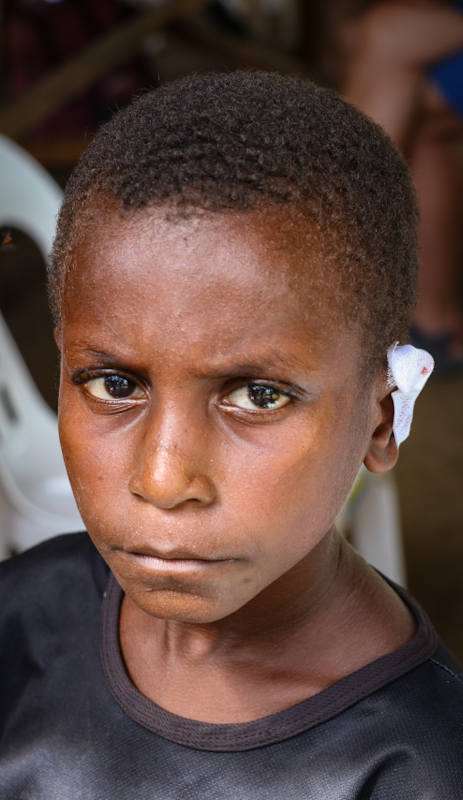
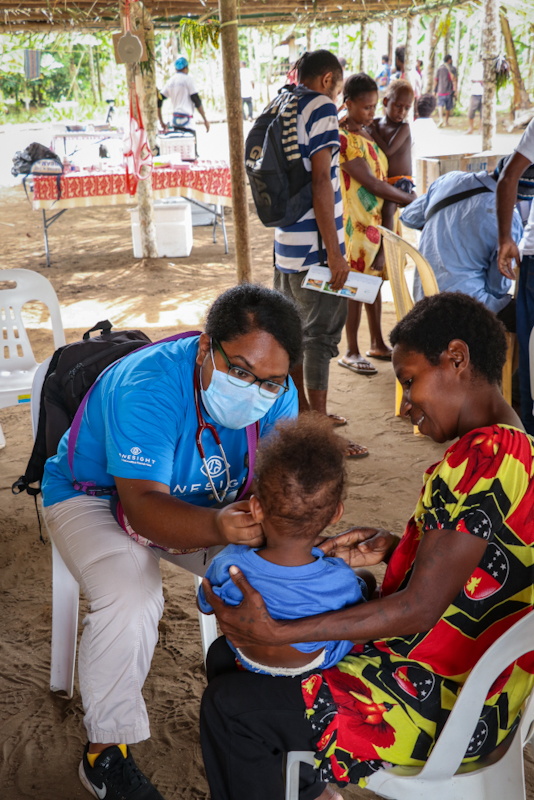
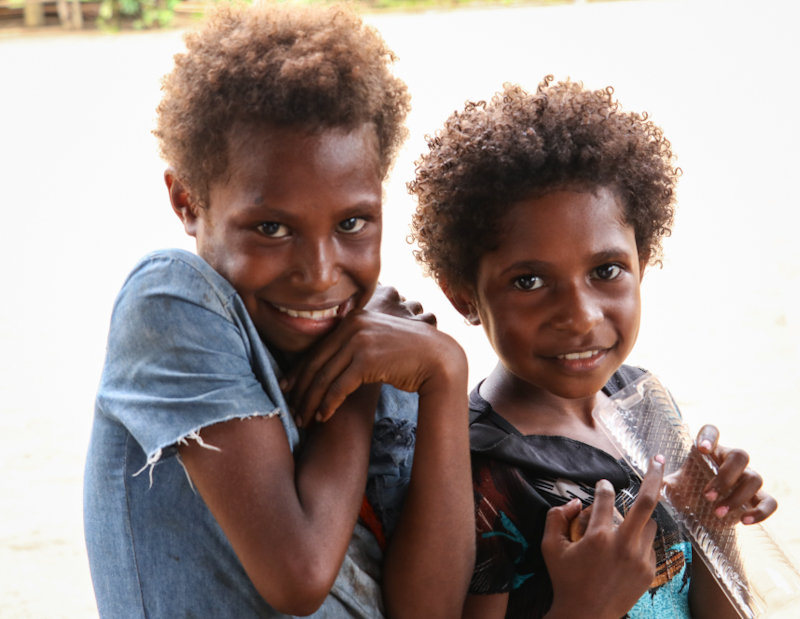
It’s 1:30 pm, the day is stretching limply after lunchtime with the last patients. I leave the family planning area, saying I’m going to pack my things. Without warning, a “bus” of pedestrians arrives silently, in single file, out of the jungle: 150 children from the nearby school accompanied by their teacher… An hour’s walk separates them from us. They’re here for their measles and tetanus booster shots… Quickly organized, we have an hour to vaccinate everyone. Each task is cut out: opening syringes, preparation, injections. In thirty minutes, 65 children receive 2 booster doses of measles and tetanus. We even leave the village before 3pm.
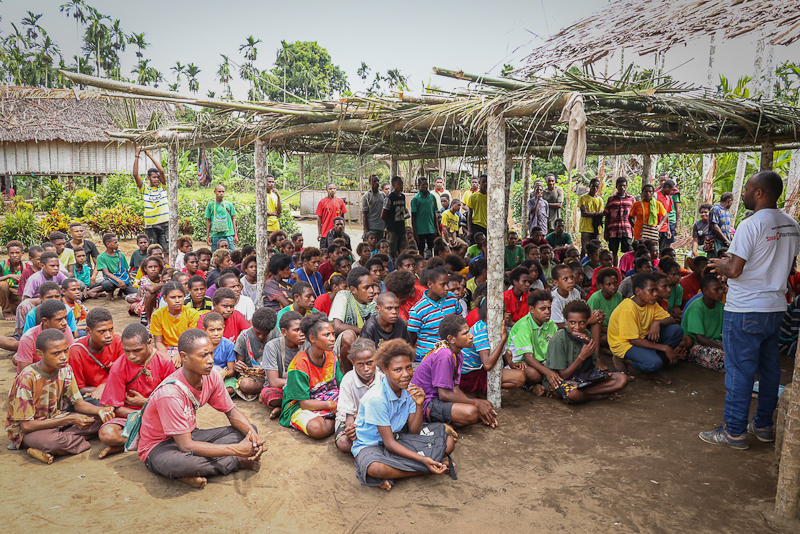
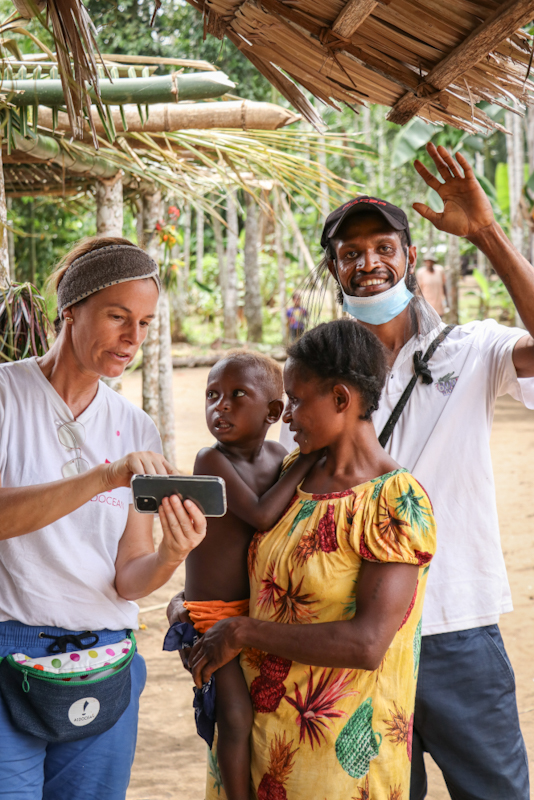
Jour 17 : Vendredi 26 avril
The sky is gray, a tropical gray. The branches of the river follow one another, framed by a deep green. The meanders narrow and widen as the boat goes. The boat lurches, stops, starts again… over and over again… because of a wooden canoe with an oarsman, a fishing net stretched across the water, a blind bend. After an hour, we land in another arm. A village outside Total’s area of influence. The atmosphere among Total employees is… cautious. Two policemen accompany us. A local team with the priest and the men in yellow arrive in advance to make sure all is calm.

On the banks of the river, a rugby pitch of impressive dimensions. The grass is short, and apart from a puddle of water in the middle, you’d think the lawn mower had been used yesterday… On closer inspection, the pitch is full of holes and bumps, a special place for sprained ankles.
The consultations are set up under grey skies, with tables and chairs in short supply this morning… A little later, the rain chases us under the shelter of the stilt houses. The morning continues and quickly dries up. Today’s theme: Tinea imbricata. A fungal disease that causes arabesque patterns on the skin, sometimes covering a very large part of the body. Every day has its dominant disease… By midday, there’s no one left.
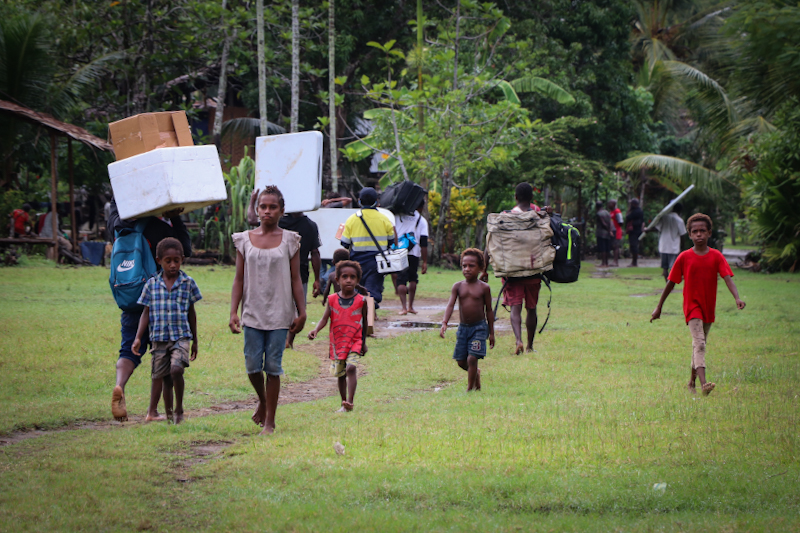
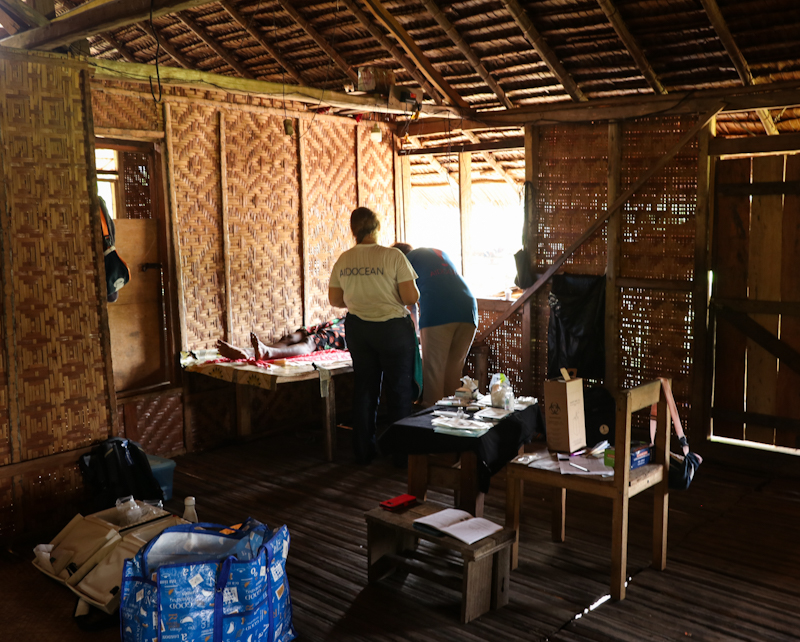
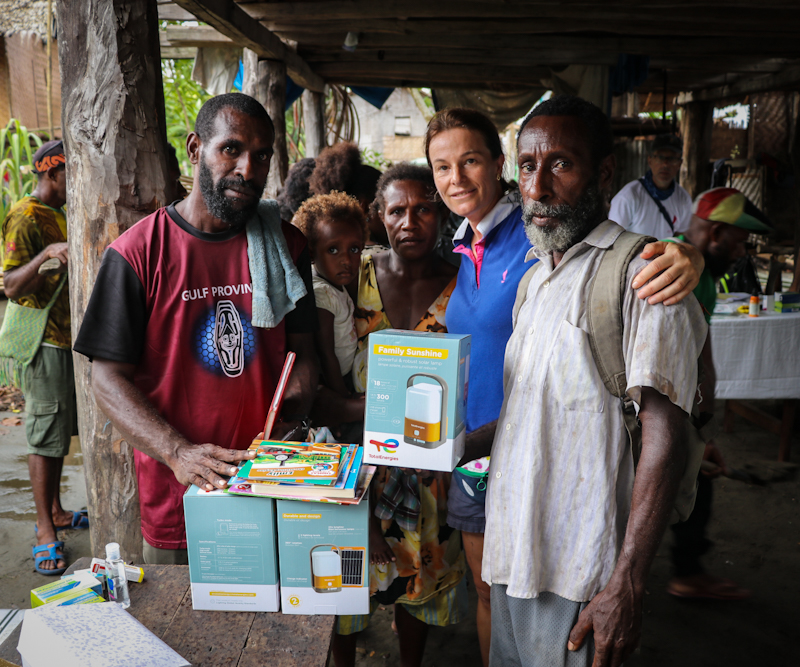
On the way back, in sight of the Silverstar, we come across a banana boat which signals that they have an emergency on board… We couple up. David and I, sutures between our teeth, wait to see the wound… The injured man is taken aboard our dinghy, carried by one of his friends. His limb is wrapped in a bleeding cloth… A blow from an axe… this is going to be sport. Foot unwrapped, the wound is 2cm, superficial. Well, we’re going to suture anyway, aren’t we! People are happy, and that’s the main thing.


Day 18: Saturday, April 27
Maipenairu village
The name of this village means “fatherless clan” and is interpreted as a message of welcome to people who have no leaders. Territorial tribal disputes have driven people down to the mouth of the Purari and settled there. Social organization is patriarchal, and cohesion is maintained by clan chiefs, together with priests, the judiciary and the police. The education system also plays an important role in social organization. Here, the land belongs to the men and is handed down from father to son. Each family belonging to the clan is assigned a plot of land for its own personal use, including gardening and sago. Everyone is allowed to hunt on unoccupied land and fish in the river. Women’s main role is to look after the children, make sago, fish and sell produce at the market. Marriage takes place between the ages of 14 and 20. So much for today’s cultural highlights… I’ll tell you more about the Sago later.
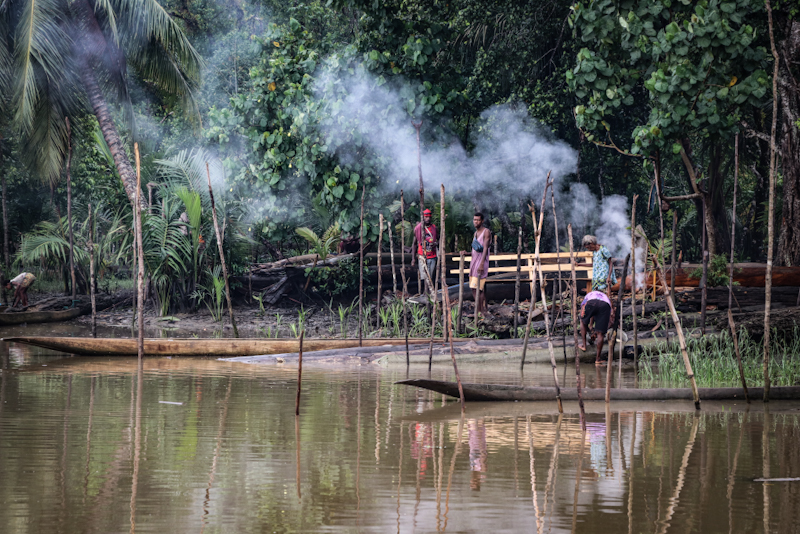
It’s been over a week since the M/V Silverstar anchored in the delta. We’ve only moved a few hundred meters, and are cruising around with the Barramundi. An hour each way, morning and evening. Again this morning, outside Total’s sphere of influence, caution is the order of the day and a delegation will arrive before us to ensure a favourable reception.Two days ago, we decided to stop work at 3pm. The village is bathed in the remnants of a rainstorm. The sandy streets are waterlogged and muddy, and we wade from house to house. A refreshing footbath… The medical center turns out to be too narrow, with a floor too fragile for the team and the flood of patients. And frankly, it’s as dark as a tunnel. We’ll leave the family planning and the dentist to do their stuff.
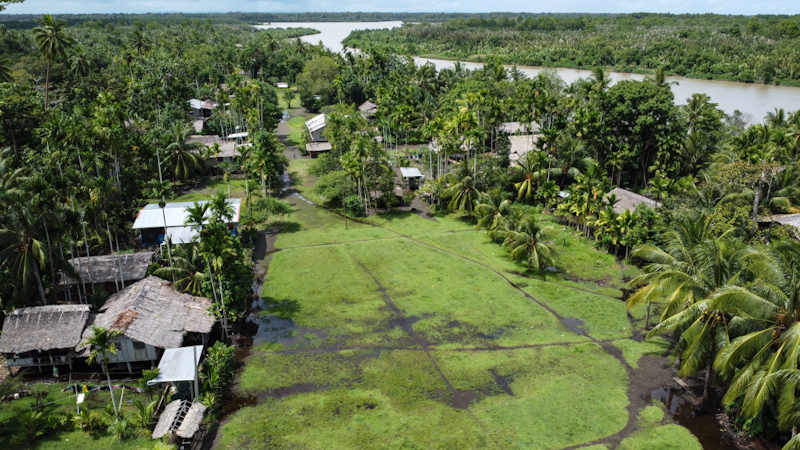
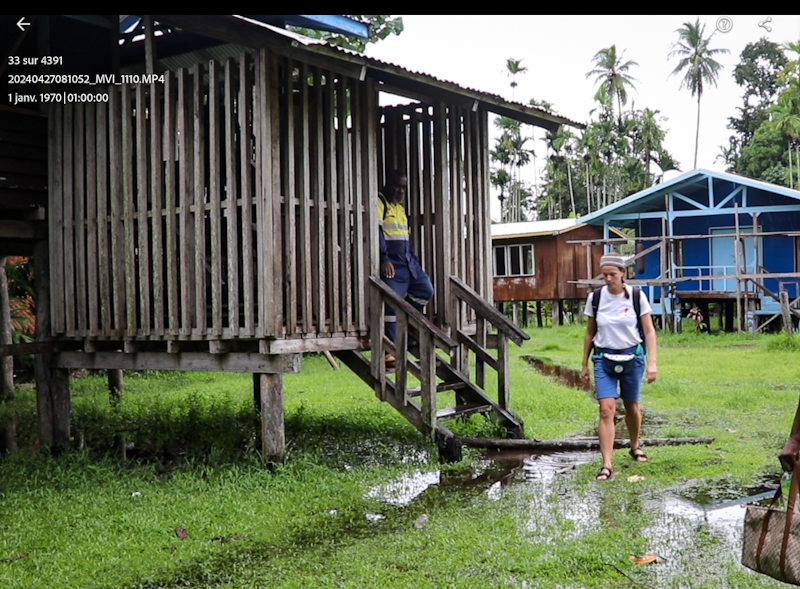
The rest of the activities move into the school with the teacher’s permission. The school is empty on this Saturday. The village is quiet, and it’s explained that most people have left for catechumenical activities an hour’s walk away, so there won’t be many people around. What’s more, Kapuna isn’t far away and people are used to using the hospital more easily. In short, a short day ahead. I alternate between downtime and helping out with the vaccinations, so as not to be overwhelmed by the heat.
Two classes are brought in by their teachers for vaccinations, and the children line up in a row with just over forty teenagers. In the end, between vaccinations and consultations, the number of people seen is far from insignificant.
This morning’s stagnant water has warmed up, and the almost pleasant footbath has turned into a hot, swampy mud bath by early afternoon… The next person with a fever, I’ll give an antibiotic…
